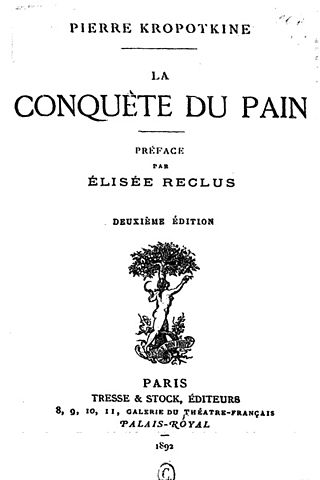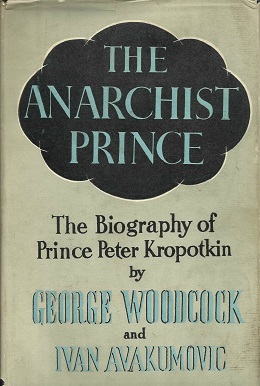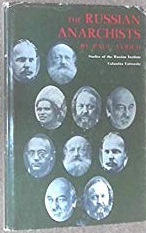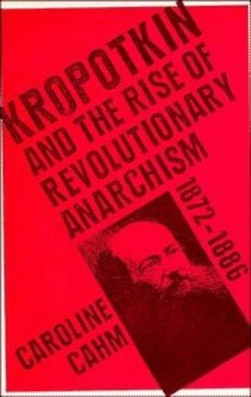Anarchism is a political philosophy and movement that is skeptical of all justifications for authority and seeks to abolish the institutions it claims maintain unnecessary coercion and hierarchy, typically including nation states, and capitalism. Anarchism advocates for the replacement of the state with stateless societies and voluntary free associations. As a historically left-wing movement, this reading of anarchism is placed on the farthest left of the political spectrum, usually described as the libertarian wing of the socialist movement.

Pyotr Alexeyevich Kropotkin (1842–1921) was a Russian anarchist and geographer known as a proponent of anarchist communism.

The Conquest of Bread, also known colloquially as The Bread Book, is an 1892 book by the Russian anarchist communist Peter Kropotkin. Originally written in French, it first appeared as a series of articles in the anarchist journal Le Révolté. It was first published in Paris with a preface by Élisée Reclus, who also suggested the title. Between 1892 and 1894, it was serialized in part in the London journal Freedom, of which Kropotkin was a co-founder.
Green anarchism, also known as ecological anarchism or eco-anarchism, is an anarchist school of thought that focuses on ecology and environmental issues. It is an anti-capitalist and anti-authoritarian form of radical environmentalism, which emphasises social organization, freedom and self-fulfillment.
The history of anarchism is ambiguous, primarily due to the ambiguity of anarchism itself. Scholars find it hard to define or agree on what anarchism means, which makes outlining its history difficult. There is a range of views on anarchism and its history. Some feel anarchism is a distinct, well-defined 19th and 20th century movement while others identify anarchist traits long before first civilisations existed.

Paul Avrich was a historian of the 19th and early 20th century anarchist movement in Russia and the United States. He taught at Queens College, City University of New York, for his entire career, from 1961 to his retirement as distinguished professor of history in 1999. He wrote ten books, mostly about anarchism, including topics such as the 1886 Haymarket Riot, 1921 Sacco and Vanzetti case, 1921 Kronstadt naval base rebellion, and an oral history of the movement.
Philosophical anarchism is an anarchist school of thought which focuses on intellectual criticism of authority, especially political power, and the legitimacy of governments. The American anarchist and socialist Benjamin Tucker coined the term philosophical anarchism to distinguish peaceful evolutionary anarchism from revolutionary variants. Although philosophical anarchism does not necessarily imply any action or desire for the elimination of authority, philosophical anarchists do not believe that they have an obligation or duty to obey any authority or conversely that the state or any individual has a right to command. Philosophical anarchism is a component especially of individualist anarchism.
Contemporary anarchism within the history of anarchism is the period of the anarchist movement continuing from the end of World War II and into the present. Since the last third of the 20th century, anarchists have been involved in anti-globalisation, peace, squatter and student protest movements. Anarchists have participated in armed revolutions such as in those that created the Makhnovshchina and Revolutionary Catalonia, and anarchist political organizations such as the International Workers' Association and the Industrial Workers of the World have existed since the 20th century. Within contemporary anarchism, the anti-capitalism of classical anarchism has remained prominent.

Maria Isidorovna Goldsmith, also known as Marie Goldsmith, was a Russian Jewish anarchist and collaborator of Peter Kropotkin. She also wrote under the pseudonyms Maria Isidine and Maria Korn.

The Anarchist Prince is a biography of Peter Kropotkin by George Woodcock and Ivan Avakumović.

The Russian Anarchists is a history book by Paul Avrich about the Russian anarchist movement from the 19th century to the Bolshevik revolution.

Anarchist Portraits is a 1988 history book by Paul Avrich about the lives and personalities of multiple prominent and inconspicuous anarchists.

Kropotkin is a biography of the Russian anarchist Peter Kropotkin written by historian Martin A. Miller and first published in 1976 by University of Chicago Press.
Fields, Factories, and Workshops is an 1899 book by anarchist Peter Kropotkin that discusses the decentralization of industries, possibilities of agriculture, and uses of small industries. Before this book on economics, Kropotkin had been known for his militant activity in behalf of international anarchism and writings on Siberian geography. Through the book, he sought to connect anarchism with science, based on sociological tendencies. The book was compiled from essays he had published in Nineteenth Century and Forum between 1888 and 1890. The book was first published in 1899 by Houghton-Mifflin (Boston) and Hutchinson (London) to favorable reviews among Britons. It has since been republished in multiple editions: Swan Sonnenschein (London) and Putnam in 1901, 1904, 1907, 1909, and Nelson (London) and Putnam in 1913 and 1919. Reproductions of the first and second editions appeared in 1968. A later edition, edited by Colin Ward for Harper & Row, released in 1974 with more contemporary illustrations as Fields, Factories and Workshops Tomorrow.

Anarchism is book-length study of anarchism written by Paul Eltzbacher. It was originally published in 1900 and quickly translated into five languages, including English in 1908 by Steven T. Byington.

Kropotkin and the Rise of Revolutionary Anarchism, 1872–1886 is a history book by Caroline Cahm that traces anarchist Peter Kropotkin's ideas and influence within European radicalism and socialism during his life.
An Appeal to the Young is a revolutionary, anarchist pamphlet published in 1880 and written by the Russian anarchist Peter Kropotkin. It is one of the most successful and moving tracts by Kropotkin in favor of a Socialized economy.
This is a list of works by Murray Bookchin (1921–2006). For a more complete list, please see the Bookchin bibliography compiled by Janet Biehl.
Marshall Sharon Shatz is an American historian and scholar of Russia.










